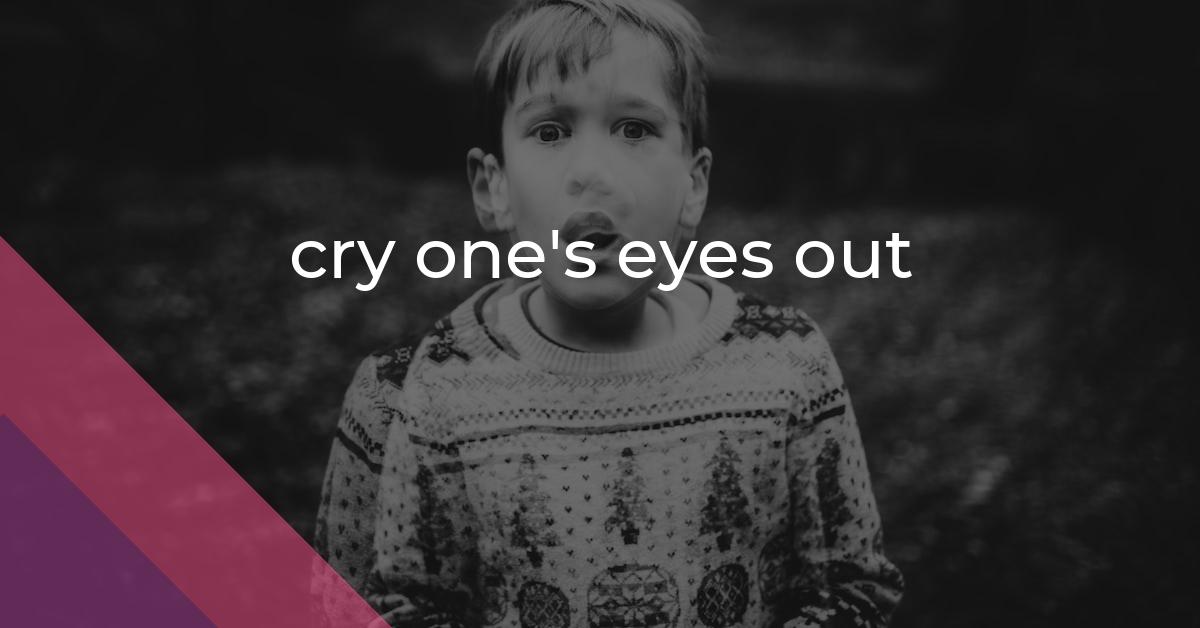cry one’s eyes out: Idiom Meaning and Origin
What does ‘cry one's eyes out’ mean?
The idiom cry one's eyes out means to cry so much and so hard that one's eyes become swollen or red.

Idiom Explorer
The idiom "shed a tear" refers to the act of crying or expressing sadness by letting tears flow from one's eyes.
The idiom "knock oneself out" means to exert a lot of effort or work extremely hard. It is often used to encourage someone to do something with great enthusiasm or without holding back.
The idiom "have eyes bigger than one's stomach" means to take or desire more than one can actually consume or handle.
The idiom "hard on the eyes" is used to describe something that is visually unappealing or difficult to look at.
The idiom "get one's panties in a wad" means to become excessively upset, angry, or agitated over a trivial or insignificant issue.
The idiom "get one's panties in a pretzel" means to become excessively upset, irritated, or overreact to a situation. It implies an exaggerated emotional response and is often used to describe someone who is easily angered or frustrated.
Tearful Catharsis
The idiom "bawl one's eyes out" is closely related to "cry one's eyes out". Both idioms convey the same meaning of intense emotional distress expressed through tears. While "cry one's eyes out" suggests a continuous and prolonged crying, "bawl one's eyes out" emphasizes the loud and uncontrollable nature of the crying. When someone is bawling their eyes out, they are sobbing loudly and without restraint, often due to overwhelming sadness or grief.
An alternative expression related to crying is "shed a tear". This phrase is used to describe the act of crying in a more subtle and restrained manner. While "cry one's eyes out" and "bawl one's eyes out" imply a more intense emotional release, "shed a tear" suggests a softer and more controlled form of crying. It can be used to depict a moment of vulnerability or sensitivity, where even a single tear signifies deep emotion.
Another related idiom is "dry one's eyes", which offers a contrast to the act of crying. When someone is asked to "dry their eyes", it means to stop crying and regain composure. This idiom is often used as a comforting phrase to console someone who is upset or distressed. It implies the need to move on from the emotional turmoil and find solace or resolution.
Yet another expression connected to crying is "cry oneself to sleep". This idiom refers to the act of crying until one falls asleep. It suggests a state of extreme sorrow or emotional pain that persists even during sleep. When someone cries themselves to sleep, it signifies a deep sadness that lingers even when they seek rest.
Lastly, the idiom "cry someone a river" has a similar connotation to "cry one's eyes out". It describes the act of crying in such an excessive quantity that it can fill a river. This idiom is often used in a dismissive or sarcastic way to downplay someone's sadness or to suggest that their tears are excessive or unwarranted. It implies a lack of sympathy or understanding towards another person's emotions.
The idiom "cry one's eyes out" is a powerful expression of intense emotional distress conveyed through tears. It signifies a state of complete emotional release, where one is overwhelmed with sadness, grief, or anguish. Related idioms like "bawl one's eyes out", "shed a tear", "dry one's eyes", "cry oneself to sleep", and "cry someone a river" offer slight variations in the intensity, manner, and perspective of crying. Together, these idioms contribute to the rich and nuanced language used to describe the depths of human emotions.
Example usage
Examples of how the idiom "cry one's eyes out" can be used in a sentence:
- She watched a sad movie and cried her eyes out.
- After her breakup, Sarah cried her eyes out for hours.
- When she saw her pet cat had gone missing, she cried her eyes out in distress.
More "Emotion" idioms



